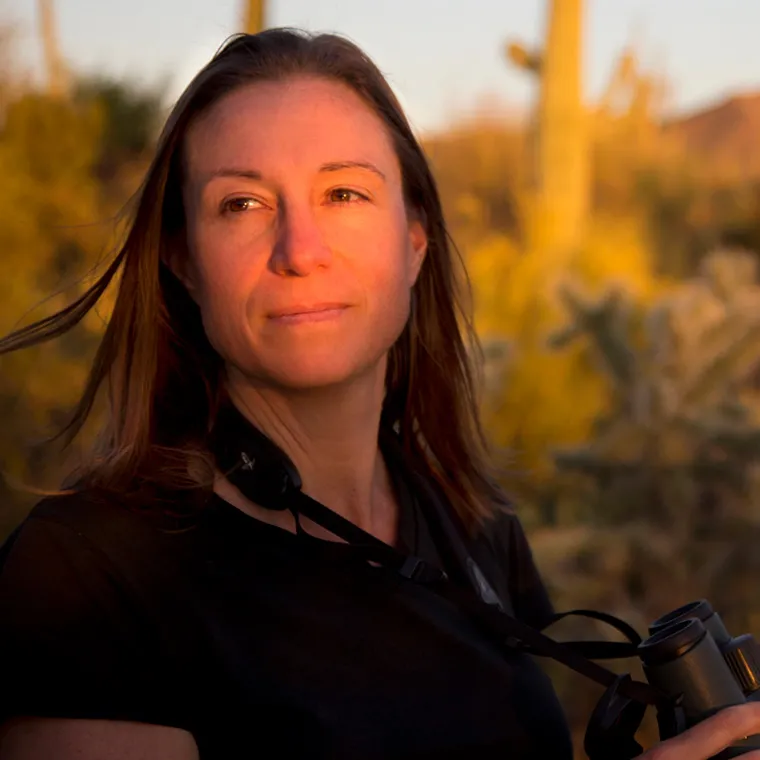Renee Duckworth
Positions and Education:
- Professor, Ecology and Evolutionary Biology, University of Arizona, 2023-present
- Associate Professor, Ecology and Evolutionary Biology, University of Arizona, 2016-2023
- Assistant Professor, Ecology & Evolutionary Biology, University of Arizona, 2010-2016
- G. G. Simpson Fellow, Ecology & Evolutionary Biology, University of Arizona, 2008-2009
- Postdoctoral Fellow, Organismic & Evolutionary Biology, Harvard University, 2007-2008
- Postdoctoral Fellow, Institute of Evolutionary Biology, Edinburgh University, 2006-2007
- Ph.D., Biology, Duke University, 2006
Honors and Awards:
- NSF CAREER, 2014-2021
- Fellow, American Ornithological Society, 2017
- Young Investigator Prize, American Society of Naturalists, 2009
- Ned K. Johnson Young Investigator Award, American Ornithologists Union, 2009
- Early Career Scientist Award, Evolutionary Ecology, University of Michigan, 2007
- NSF International Research Fellow, 2006-2008
- American Museum of Natural History Frank M. Chapman Award, 2004
Editorial Work:
- Associate Editor: The American Naturalist (2018-cur)
- Associate Editor: Evolutionary Ecology (2009-2017)
- Associate Editor: Condor: Int. J. Avian Biology (2008-2012)
Research Interests:
My research integrates ecological and evolutionary concepts with the ultimate goal to understand how complex traits evolve. The two central goals of my research are to understand how behavior evolves and how evolutionary changes in behavior influence population dynamics that ultimately shape macroevolutionary processes. To achieve these goals, I use large- scale field experiments, empirical measures of lifetime fitness, field endocrinology and molecular multi-generational pedigree reconstruction to investigate the dynamics of trait evolution in the context of range expansion and species coexistence in passerine birds. Current projects in my lab include 1) eco-evolutionary feedbacks between behavioral change and population density, 2) investigating proximate epigenetic basis of maternal effects on dispersal strategies 3) investigating neuroendocrine mechanisms and developmental constraints on personality traits 4) comparative studies across vertebrates on evolution of traits that affect range limits and species coexistence.
Selected Publications:
- Duckworth, RA., Potticary, AL and Badyaev, AV. 2018. On the origins of adaptive behavioral complexity: Developmental channeling of structural trade-offs. Advances in the Study of Behavior 50: 1-36.
- Duckworth, RA, & Semenov, G. 2017. Hybridization associated with cycles of ecological succession in a passerine bird. American Naturalist 190: E94-E105.
- Duckworth, RA, Belloni, V and Anderson, SR. 2015. Cycles of species replacement emerge from locally induced maternal effects in a passerine bird. Science 374: 875-877.
- Duckworth, RA. 2015. Neuroendocrine mechanisms underlying behavioral stability: implications for the evolutionary origin of personality. Annals of the New York Academy of Sciences 1360: 54-74.
- Aguillon, SM & Duckworth, RA. 2015. Kin aggression and resource availability influence phenotype-dependent dispersal in a passerine bird. Behavioral Ecology & Sociobiology 69:625-633.
- Duckworth RA. and Sockman, KW. 2012. Proximate mechanisms of behavioural inflexibility: Implications for the evolution of personality traits. Functional Ecology 26: 559-566.
- Duckworth RA. 2012. Evolution of genetically integrated dispersal strategies.Pp: 83-94 in: Clobert J, et. al (eds) Dispersal Evolution and Ecology. Oxford Univ. Press
- Duckworth, RA. 2010. Evolution of personality: developmental constraints on behavioral plasticity. Invited Perspective. Auk: Intl J. Ornithol. 127: 752-758.
- Duckworth, RA. 2009. Maternal effects and range expansion: A key factor in a dynamic process? Philosophical Transactions of the Royal Society B 364: 1075-1086.
- Duckworth, RA & LEB Kruuk. 2009. Evolution of genetic integration between dispersal and colonization ability in a bird. Evolution: 63-4: 968-977.
- Duckworth, RA. 2009. The role of behavior in evolution: a search for mechanism. Evolutionary Ecology: 23: 513-531.
- Duckworth, RA. 2008. Adaptive dispersal strategies and the dynamics of a range expansion. American Naturalist 172: 4-17.
- Duckworth, RA, & AV Badyaev. 2007. Coupling of dispersal and aggression facilitates the rapid range expansion of a passerine bird. Proceedings of the National Academy of Science, USA 104: 15017-15022.
- Duckworth, RA. 2006. Aggressive behavior affects selection on morphology by determining the environment of breeding in a passerine bird. Proceedings of the Royal Society of London B273: 1789-1795.
- Duckworth, RA. 2006. Behavioral correlations across breeding contexts provide a mechanism for a cost of aggression. Behavioral Ecology17: 1011-1019.


